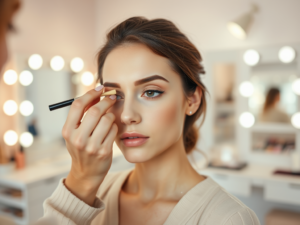How to Choose the Skincare Products Best Suited for Your Skin, According to Dermatologists
Choosing the right skincare products can feel overwhelming, especially with the plethora of options available. Thankfully, dermatologists provide essential guidance on how to tailor your skincare routine to your unique skin type and concerns. The key lies in understanding your skin’s needs, reading labels carefully, and opting for ingredients that work effectively for you. In this article, we will explore effective methods to identify suitable skincare products and practices that can enhance your skin health. Let’s delve into the expert advice on making informed choices.
Identify Your Skin Type
The first step in selecting the right skincare products is to know your skin type. Dermatologists typically categorize skin into five main types: normal, oily, dry, combination, and sensitive. Each type has distinct characteristics and requires specific care. For instance:
- Normal Skin: This skin type is well-balanced, with an even tone and texture.
- Oily Skin: Excess sebum production leads to shine, enlarged pores, and often acne.
- Dry Skin: This type lacks moisture, leading to flakiness, rough texture, and irritation.
- Combination Skin: A mix of oily and dry areas, often characterized by an oily T-zone.
- Sensitive Skin: Easily irritated, this skin type may react to products and environmental factors.
Once you determine your skin type, you’ll have a clearer direction on what formulations and ingredients to look for in your skincare products. A patch test can also help identify sensitivities to certain ingredients, ensuring choices that cater to your skin’s specific needs.
Understand Key Ingredients

Knowing the ingredients that suit your skin type is crucial. Dermatologists emphasize the importance of reading product labels and understanding what each ingredient does. Here are some beneficial ingredients categorized by skin type:
- For Oily Skin: Look for ingredients like salicylic acid, niacinamide, and tea tree oil, which can help reduce oiliness and prevent breakouts.
- For Dry Skin: Seek products containing hyaluronic acid, glycerin, and ceramides to boost hydration and moisture retention.
- For Sensitive Skin: Opt for gentle formulas with chamomile, aloe vera, or calendula to soothe and calm irritation.
- For Combination Skin: Use lightweight, non-comedogenic moisturizers and ingredients that balance oil and dryness, like rose water or witch hazel.
- For Normal Skin: You can benefit from a versatile skincare routine that includes antioxidants like vitamin C and gentle exfoliants.
Choosing products with the right balance of active ingredients can significantly enhance your skin’s appearance and health.
Consider Lifestyle and Environmental Factors

Your lifestyle choices and environmental factors play a pivotal role in your skin’s condition. Factors such as diet, sleep, stress levels, and environmental exposure can affect your skin’s health. For instance:
- High-stress levels can exacerbate skin conditions like acne and eczema.
- Living in pollution-heavy areas may necessitate the use of antioxidant-rich products that protect skin from free radicals.
- A balanced diet rich in fruits, vegetables, and healthy fats can improve overall skin health.
- Proper hydration and sleep can also lead to a more radiant complexion.
- Seasonal changes may require adjustments to your skincare routine, such as switching to heavier creams in winter.
By considering these factors, you can choose products that not only cater to your skin but also complement your overall lifestyle. For instance, consider using a heavier moisturizer in winter while opting for lighter products during humid summer months.
Consult with a Dermatologist
To make the most informed decisions about your skincare regimen, consulting with a dermatologist is of utmost importance. A professional can provide personalized recommendations based on your specific needs, whether you’re dealing with acne, signs of aging, or irritation. During a consultation, they may assess factors including:
- Your skin type and texture.
- Current skincare products and routines.
- Any specific skin concerns you may have.
- Your allergies or sensitivities to certain ingredients.
- Possible skin treatment options to improve your skin health.
Dermatologists can also offer insight on how to incorporate new products gradually and monitor your skin’s response over time. They often recommend patch testing new products and building a routine that prioritizes your skin’s health over chasing trends.
Trial and Patience
After acquiring knowledge about your skin type and suitable products, the next step involves trial and error. It’s essential to give new products time to work before switching, typically around 4 to 6 weeks, as skin renewal cycles can vary. This period allows the product’s efficacy to show without prematurely discontinuing use. Additionally, it is important to maintain a consistent routine during this time:
- Start with basic products tailored to your skin type and gradually incorporate actives.
- Keep track of what works and what doesn’t, noting any changes in your skin.
- Adjust your routine based on seasonal changes and skin reactions.
- Remember that major shifts in skin condition should prompt further consultation with a dermatologist.
- Be patient, as achieving your desired skin may take time and persistence.
Regular evaluation of your skincare products helps you make timely adjustments, ensuring continued health and vibrancy of your skin.
Conclusion
Choosing the best skincare products for your unique skin requires a multifaceted approach, including identifying your skin type, understanding key ingredients, considering lifestyle factors, and consulting with dermatologists. Remember, trial and patience are crucial in this journey toward healthy skin. By making informed choices and listening to your skin’s feedback, you can achieve a tailored skincare routine that promotes lasting beauty and health. Your skin deserves the best, and with this knowledge, you’re well on your way to selecting the perfect products for your needs.
FAQs
1. How can I determine my skin type at home?
You can determine your skin type by conducting the “bare-faced test” — wash your face, pat it dry, and wait for an hour. Observe how your skin feels: tightness suggests dryness, while oiliness indicates oily skin. Normal skin will neither feel greasy nor dry, and combination skin will have both oily and dry areas.
2. How often should I switch my skincare products?
It’s best to give at least 4-6 weeks after introducing a new product before determining if it works or not. If your skin reacts negatively, discontinue use sooner and consult a dermatologist.
3. Are expensive skincare products more effective?
Not necessarily. Effectiveness depends on ingredients rather than price. Many affordable products contain potent active ingredients that can deliver strong results. Always look at the ingredient list rather than the price tag.
4. Can my skin type change over time?
Yes, your skin can change due to factors such as age, hormonal changes, diet, climate, and lifestyle shifts. Regularly assessing your skin type is essential to adapt your skincare routine accordingly.
5. Should I use multiple products in my skincare routine?
A basic skincare routine should include a cleanser, moisturizer, and sunscreen. Depending on your skin concerns, you can incorporate serums, treatments, or exfoliants. Just ensure to keep your routine simple to avoid overwhelming your skin.







